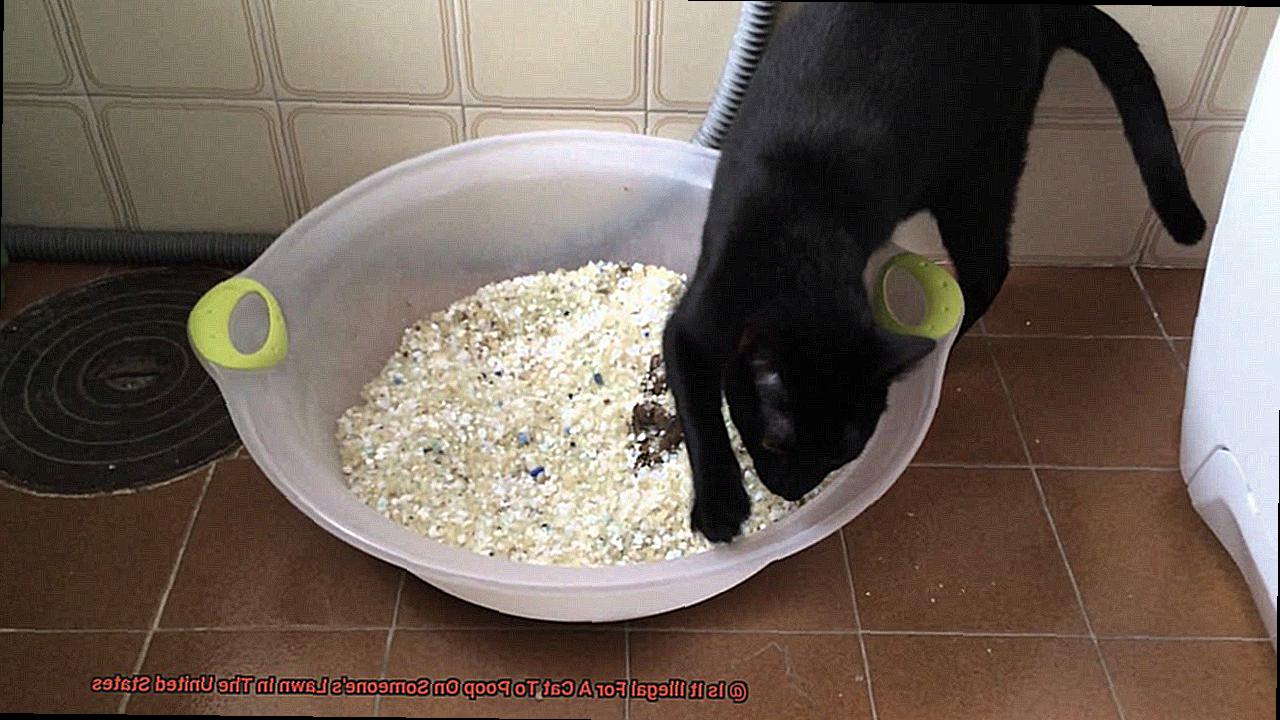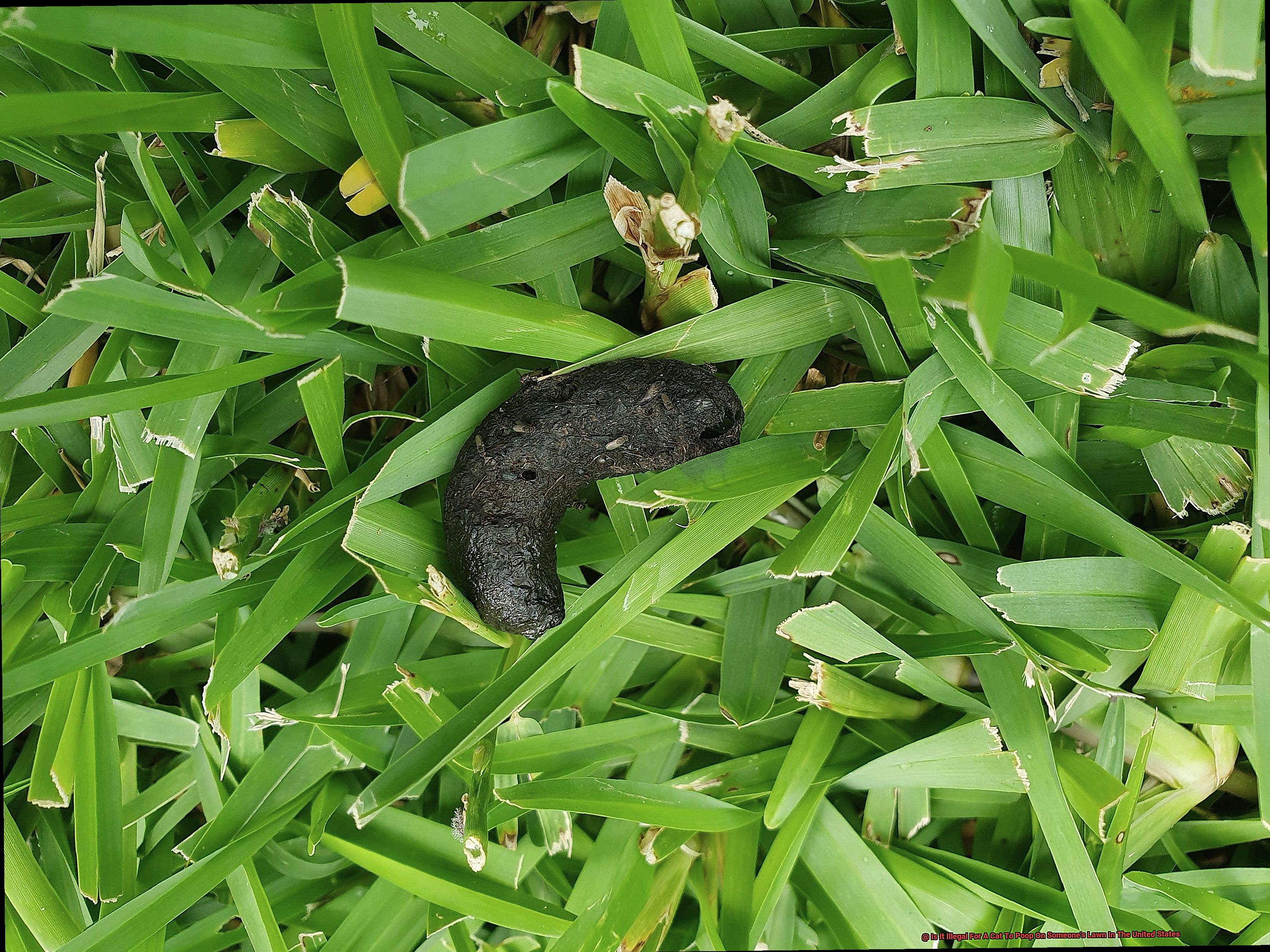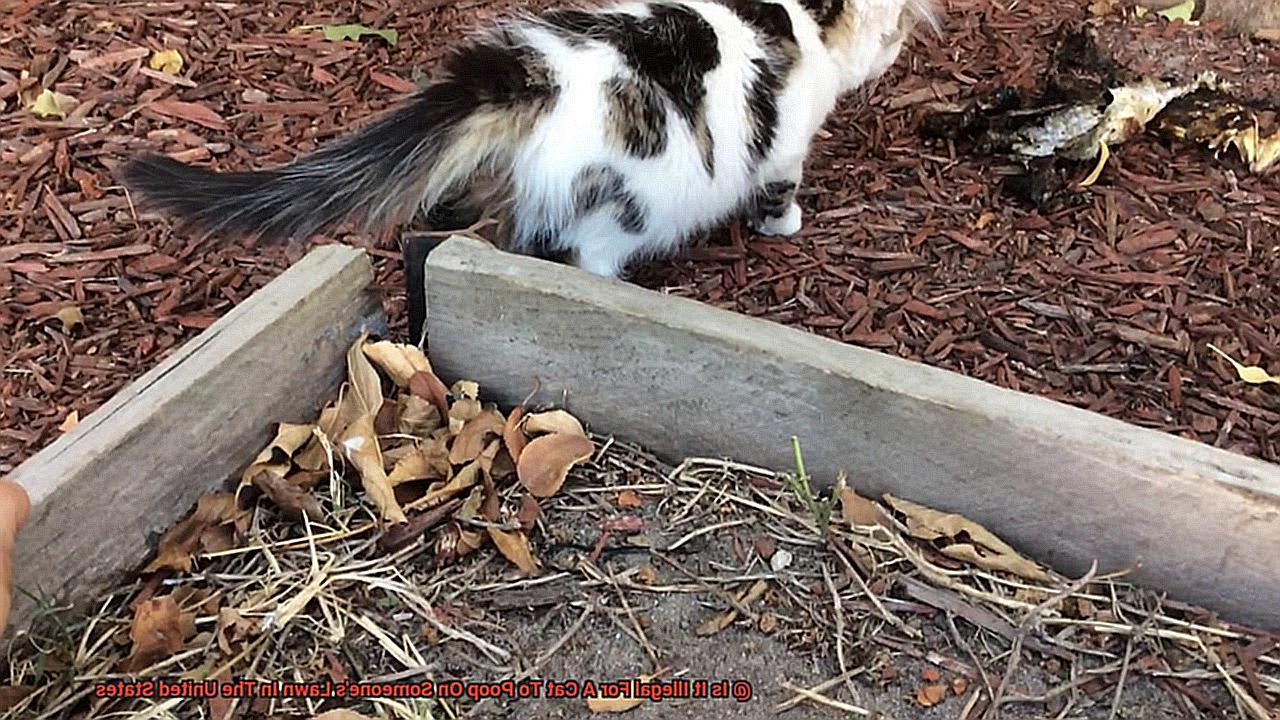Calling all pet owners, environmental enthusiasts, homeowners, and law-abiding citizens. We have a topic that’s sure to pique your interest. Have you ever found cat poop on your lawn, even though you don’t own a cat? Or perhaps you’re a cat owner yourself and wonder about your furry friend’s toilet habits outside of the home. Regardless of which category you fall into, we’re here to answer the age-old question: Is It Illegal For A Cat To Poop On Someone’s Lawn In The United States?
In this blog post, we’ll delve deep into this intriguing topic. We’ll explore the legal implications of cat defecation on someone else’s property and discuss measures you can take to keep your yard clean.
But that’s not all – we’ll also examine the environmental impact of cat waste and touch on broader ethical considerations surrounding cat ownership.
So, let’s find out.
Overview of Laws and Regulations
While there are no federal laws in the United States specifically addressing this issue, there are still potential legal consequences if your cat causes damage or nuisance to someone else’s property.
Under various state and local laws, if you allow your cat to roam freely and it repeatedly damages someone else’s property or causes a nuisance, you could be held liable. These laws could include trespassing, property damage, or public health concerns. It’s important to remember that if your cat were a car hitting someone else’s property, you would be responsible for fixing the damage.
To avoid potential legal issues, many cities and towns have enacted ordinances requiring cat owners to keep their pets on a leash or confined to their property. Violating these ordinances could result in fines or other penalties. By following these regulations and being mindful of your pet’s behavior, you can maintain good relationships with your neighbors and avoid any legal issues.
It’s also important to note that some states have laws requiring pet owners to clean up after their pets when they defecate in public areas. This includes parks, sidewalks, and even someone else’s lawn. Failing to do so could result in fines or other penalties.
While there may not be a specific law against cats pooping on someone’s lawn, it’s important to follow common courtesy and etiquette expectations.
If your cat tends to use a neighbor’s lawn as a litter box, take steps to prevent this from happening by confining your pet or promptly cleaning up after them. Remember that just because there isn’t a specific law against it doesn’t mean it’s acceptable behavior.

Trespassing Laws

Trespassing laws vary by state, but generally, a homeowner has the right to exclude others from their property. This means that if a cat enters someone’s yard without permission, it could be considered trespassing. However, unlike dogs, cats are not usually required to be on a leash or under control when outside. This means that they are more likely to roam freely and potentially enter someone else’s property.
As responsible cat owners, it’s important to take preventative measures to avoid any potential legal issues. Installing fencing or other barriers can help keep your cat in your yard and away from neighboring properties. It’s also a good idea to monitor your cat’s outdoor activities more closely.
If your cat does happen to enter someone else’s property without permission and causes damage or a nuisance, the homeowner may be able to take legal action against you. However, proving that the cat was at fault can be difficult and may not result in a successful case.
Overall, it’s important to approach the situation with common sense and preventative measures. We want our cats to enjoy the great outdoors while also being responsible pet owners.
Property Damage Laws
It’s crucial to understand that our pets’ actions can have legal consequences if they cause damage to someone else’s property. Property damage laws vary from state to state, but the underlying principle is that pet owners are responsible for any damage their animals cause to someone else’s property.
Even something as seemingly harmless as your cat using your neighbor’s lawn as a litter box can result in legal action being taken against you. Therefore, it’s essential to take action if you notice your animal causing any kind of property damage.

As a responsible pet owner, there are several ways to prevent your pet from causing property damage. This could involve installing fencing or other barriers to prevent your pet from roaming freely, monitoring their outdoor activities closely or training them to use a litter box indoors.
It’s important to note that some states have specific laws requiring pet owners to clean up after their pets in public places. However, when it comes to private property, the responsibility falls on the pet owner to ensure their animal does not cause damage.
If a neighbor approaches you with concerns about your pet damaging their property, it’s crucial to take their concerns seriously and work together to find a solution. Ignoring the problem could lead to legal action being taken against you and potential financial consequences.
In some instances, legal action may be necessary if the owner of the cat refuses to take action despite repeated requests from the affected neighbor. In such cases, the affected neighbor may choose to file a complaint with local authorities or pursue legal action.
Property damage laws exist to protect both pet owners and their neighbors. By taking responsibility for our pets’ actions and being considerate of others’ property, we can avoid any legal issues and maintain positive relationships with our neighbors. As pet owners, let us be mindful of our pets’ behavior and take preventive measures to avoid any legal consequences.
Public Health Concerns
Although it may seem harmless, cat feces can harbor harmful parasites and bacteria that can infect humans and animals alike.
One such parasite is Toxoplasma gondii, which can cause toxoplasmosis – a disease that poses a significant threat to pregnant women and individuals with weakened immune systems. Symptoms can range from flu-like symptoms such as fever, muscle aches, and fatigue to severe damage to the brain, eyes, and other organs.
But that’s not all – cat feces can also contain bacteria such as Salmonella and E. coli, which can cause food poisoning and other illnesses. When left unattended on lawns, cat feces can attract flies and other pests that can spread diseases by transferring harmful bacteria from the feces to food or surfaces.
Moreover, cat feces’ strong odor can negatively impact the quality of life for neighbors and visitors alike. And it’s not just the unpleasant smell – flies buzzing around can also be a nuisance.
So what is the solution? It’s simple: cat owners must take responsibility for their pets’ waste and dispose of it properly. This means either burying it in a designated area or placing it in a sealed bag and disposing of it in the trash.
By doing so, cat owners can help prevent the spread of diseases and maintain a healthy environment for themselves and their community.
Leash and Confinement Ordinances
These regulations are designed to maintain safety in public areas by governing the behavior of pets. However, you may be surprised to learn that these ordinances don’t necessarily apply to our feline friends. Yes, that’s right – cats are often considered free-roaming animals and aren’t required to be leashed or confined to their owner’s property.
Before you start packing away your cat’s leash, it’s important to note that there are still some regulations that cat owners should be aware of. For instance, licensing requirements or limitations on the number of cats per household may exist in certain areas. Additionally, if your cat happens to leave a little gift on someone’s lawn, it is your responsibility as the owner to clean it up. Ignoring this responsibility could lead to fines or other penalties.
While cats may enjoy the freedom of public spaces, it’s still important for owners to exercise responsibility and respect for their neighbors’ property. Cats should not be allowed to cause damage or nuisance in the community. By keeping your kitty from causing harm and exhibiting common sense practices, cats and their owners can coexist peacefully with their community.
Common Courtesy and Etiquette Expectations
While cats may not require leashes or confinement in public spaces like dogs, there are still rules that must be followed to maintain good relationships with your neighbors and avoid conflicts.
One of the most basic expectations is picking up after your cat if they happen to leave any surprises on someone else’s lawn. Although it may not be illegal, it is considered impolite and disrespectful to leave cat poop on someone’s lawn. Always carry a plastic bag with you when taking your cat for a walk outside and make sure to clean up after them promptly.
Another important expectation is keeping your cat from wandering onto other people’s property, especially if they have gardens or landscaping. Cats are naturally curious creatures and may explore neighboring properties if left unsupervised.
However, this can lead to damage to plants or other outdoor features, which can be frustrating for your neighbors. Therefore, it is essential to keep your cat on a leash or within the boundaries of your own property.
In addition to these basics, there are other things you can do as a responsible cat owner to show courtesy to your neighbors. For example, if your cat meows loudly at night, consider keeping them indoors during sleeping hours or investing in a collar with a bell that will alert birds and other small animals of their presence.
Being a responsible cat owner means adhering to common courtesy and etiquette expectations. These expectations may seem small but can make a big difference in maintaining good relationships with your neighbors. Remember always to clean up after your cat and keep them within your property boundaries to ensure everyone’s happiness and safety.
OoCPykg6Pfs” >
Conclusion
In conclusion, determining whether it is illegal for a cat to leave their mark on someone’s lawn in the United States can be complex. Although there are no federal laws governing this issue, state and local regulations may hold pet owners accountable if their cats cause harm or nuisance to others’ property. As responsible pet owners, it is vital to take precautions to prevent potential legal problems, such as setting up fencing or other barriers and closely monitoring our cats’ outdoor activities.
Additionally, cat feces can carry dangerous parasites and bacteria that can infect both humans and animals. Therefore, disposing of cat waste appropriately by burying it in a designated area or placing it in a sealed bag and discarding it in the trash is critical.
Furthermore, even though cats may not require leashes or confinement in public areas like dogs do, there are still guidelines that must be followed for good neighborly relations and conflict avoidance.







